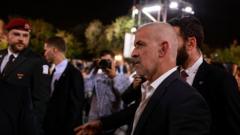The dispute between Israeli Prime Minister Benjamin Netanyahu and Shin Bet chief Ronen Bar escalates as each accuses the other of dishonesty, revealing deep political rifts in the country, compounded by ongoing protests and a war against Hamas.
Netanyahu and Shin Bet Chief in Escalating Political Clash

Netanyahu and Shin Bet Chief in Escalating Political Clash
The contentious standoff between Prime Minister Netanyahu and Shin Bet head Ronen Bar highlights increasing divisions within Israel as both men trade accusations amid legal scrutiny.
The ongoing confrontation between Prime Minister Benjamin Netanyahu and the head of the Shin Bet domestic intelligence agency, Ronen Bar, has intensified, showcasing the widening divisions in Israeli politics and society. Following Bar's dismissal last month, which Netanyahu attributed to professional shortcomings, the situation has spiraled, leading to accusations of dishonesty and political motivations from both sides. The dismissal is currently frozen due to appeals to the Supreme Court from the attorney general and the opposition.
In a recent affidavit submitted to the court, Netanyahu labeled Bar a liar, reflecting a deep mistrust. This accusation came after Bar's previous allegations that Netanyahu pressured him to display personal loyalty and monitor anti-government protests, raising alarms about overreach of intelligence operations.
Israeli citizens have taken to the streets following Bar's dismissal, opposing what they view as governmental attempts to undermine judicial power—a sentiment that has evolved dramatically since pre-Hamas attacks protests. With both parties firmly entrenched in their positions, the Supreme Court faces the challenge of determining which account to believe, amidst increasing calls for accountability and evidence of deep-rooted societal friction.
The conflict illustrates the fractured landscape within Israel, with Netanyahu's hardline supporters clashing against more liberal factions advocating for a different approach to the ongoing Gaza war and hostage crisis, thereby amplifying the national debate about governance and civil rights in the face of crisis.

















